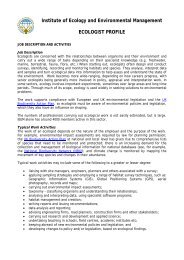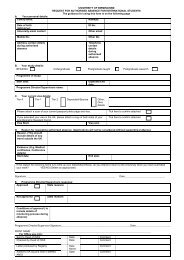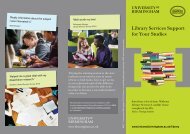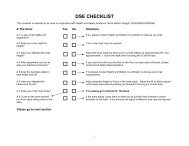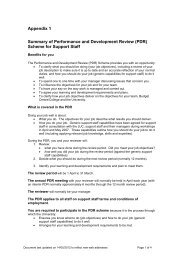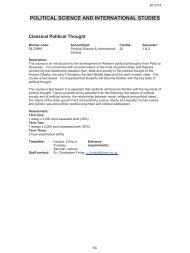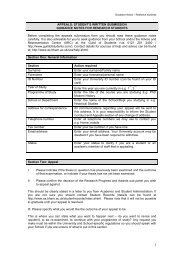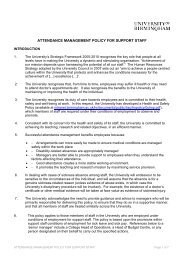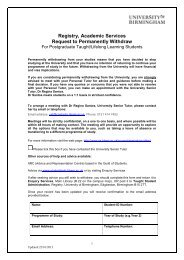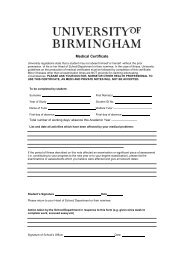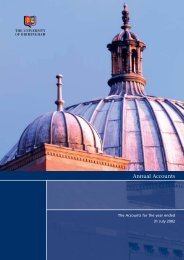PDF - 163KB - University of Birmingham
PDF - 163KB - University of Birmingham
PDF - 163KB - University of Birmingham
Create successful ePaper yourself
Turn your PDF publications into a flip-book with our unique Google optimized e-Paper software.
Peer Observation <strong>of</strong> TeachingObservation option 1What to do/look for when observing a peer’s teaching or reflecting onyour own teachingOne way <strong>of</strong> carrying out peer observation is to adopt a directed approach. This is good forthose with less experience <strong>of</strong> observing teaching, and may take various forms, including:• A checklist <strong>of</strong> pre-determined questions or global categories, for example see:ESCalate (http://www.escalate.ac.uk/resources/peerobservation/04.html) and The<strong>University</strong> <strong>of</strong> Nottingham (http://www.nottingham.ac.uk/sedu/peerobs/checklist.php)• A form with a tick list <strong>of</strong> criteria and/or open categories, such as the form providedhere (which is designed with lectures and seminars in mind)• Focus on a particular issue, for example use <strong>of</strong> visual aids, question techniques, paceand timing, interaction patterns with / between students.You do not have to use the form given here if you prefer to use a different one, or if you haveagreed to focus on a specific area. However, you should agree on your approach in advance<strong>of</strong> the observation session, and if necessary, source or prepare your own checklist orobservation categories.If this approach to peer observation is new to you, or you want to know more, go tohttp://www.prodait.org/approaches/index.phpSee also Directed Observation options 2, 3, 4 and 5.Note: The current (June 2005) <strong>University</strong> Guidelines on Peer Observation <strong>of</strong> Teaching statethat ‘All forms <strong>of</strong> teaching activity should be subject to observation’ (section 3), so you caninterpret ‘teaching’ in its broadest sense, to include not only lectures and classroom teaching, butseminars, research and pr<strong>of</strong>essional supervision, online tutoring, lab supervision …The <strong>University</strong> Guidelines (section 2) also state:‘Enhancement <strong>of</strong> an individual's teaching performance is always the primary purpose <strong>of</strong>peer observation <strong>of</strong> teaching’• The process should be such that the observer has an opportunity to identify good practicefrom the observee, and that particularly good practice can be disseminated in theDepartment/School or beyond.• Self-evaluation and formative feedback are normally confidential to the observer andobservee.• Observation should primarily consider the delivery <strong>of</strong> teaching, rather than the content.You can view the Guidelines in full at: http://www.ppd.bham.ac.uk/policy/cop/peerguide.htmYou will also need a copy <strong>of</strong> the peer observation report form, available fromhttp://www.ppd.bham.ac.uk/policy/cop/peer.htmSDU, <strong>University</strong> <strong>of</strong> <strong>Birmingham</strong> October 2005
PRIVATE AND CONFIDENTIALThis part to be completed by the observer during / after the observationSchool <strong>of</strong> ____________________________Peer Observation <strong>of</strong> TeachingObserver record <strong>of</strong> a Teaching SessionLecturer/tutor:Observer:Date:Title <strong>of</strong> Teaching Session:Degree programme:Year <strong>of</strong> programme:PREPARATION AND PLANNINGDid the lecturer/tutor............................... Entirely /always1. Identify key learning outcomes in terms<strong>of</strong> knowledge and skills?2. Place the session in context (eg withinthe degree programme, the module orthe series <strong>of</strong> lectures)?3. Pitch the content at an appropriate level?Comments:Partly /sometimesNot at all /neverSTART OF THE SESSIONDid the lecturer/tutor............................... Entirely /always1. Secure attention <strong>of</strong> the students2. Introduce subject in an interesting way3. Make the aims and learning outcomes <strong>of</strong>the session clear to the students4. Link the subject to previous sessionsComments:Partly /sometimesNot at all /neverSDU, <strong>University</strong> <strong>of</strong> <strong>Birmingham</strong> October 2005
PRIVATE AND CONFIDENTIALThis part to be completed by the observer during / after the observationEXPLANATION OF THE SUBJECTDid the lecturer/tutor............................... Entirely /always1. Demonstrate a firm grasp <strong>of</strong> the subjectarea2. Adopt a logical, structured approach3. Move clearly from stage to stage4. Emphasise key points5. Provide alternative explanations <strong>of</strong>difficult points6. Make good use <strong>of</strong> audio-visual materials7. Make good use <strong>of</strong> handouts8. Make reference to additional readingmaterialsComments:Partly /sometimesNot at all /neverPRESENTATION OF THE SESSIONDid the lecturer/tutor............................... Entirely /always1. Use legible and clear audio-visualmaterial2. Show enthusiasm3. Control the pace <strong>of</strong> delivery4. Control the timing5. Speak clearly and concisely6. Maintain an appropriate level <strong>of</strong> classcontrol and disciplineComments:Partly /sometimesNot at all /neverSDU, <strong>University</strong> <strong>of</strong> <strong>Birmingham</strong> October 2005
PRIVATE AND CONFIDENTIALThis part to be completed by the observer during / after the observationLEARNER BEHAVIOURDid the learners............................... Entirely /always1. As a cohort, attend the session2. Arrive on time3. Pay proper attention4. Undertake any tasks given to them5. Respond to the lecturer’s questions6. Ask questionsPartly /sometimesNot at all /neverComments:FINISHING THE SESSIONDid the lecturer/tutor............................... Entirely /always1. Identify how well the learning outcomeshad been achieved2. Reiterate and summarize key points3. Identify links with following sessions4. End the session positively and clearlyComments:Partly /sometimesNot at all /neverOther Comments:Include here and overleaf reference to any issues affecting the session thatwere outside the control <strong>of</strong> the lecturer/tutor e.g. accommodation, resources,or that were <strong>of</strong> concern under Health and Safety legislation. These commentsmay be communicated by the observer to the Head <strong>of</strong> School or Head <strong>of</strong> theappropriate academic unit.SDU, <strong>University</strong> <strong>of</strong> <strong>Birmingham</strong> October 2005
PRIVATE AND CONFIDENTIALThis part to be completed by the observee after the observationSchool <strong>of</strong> ____________________________Peer Observation <strong>of</strong> TeachingLecturer / tutor record <strong>of</strong> a Teaching SessionLecturer/tutor:Observer:Date:Title <strong>of</strong> Teaching Session:Degree programme:programme:Year <strong>of</strong>PREPARATION AND PLANNINGDid I ............................... Entirely /alwaysPartly /sometimesNot at all /never1. Identify key learning outcomes in terms<strong>of</strong> knowledge and skills?2. Place the session in context (eg withinthe degree programme, the module orthe series <strong>of</strong> lectures)?3. Pitch the content at an appropriate level?2. 3. 4.3. 4. 5.Comments:Why (not)?START OF THE SESSIONDid I ............................... Entirely /alwaysPartly /sometimesNot at all /never1. Secure attention <strong>of</strong> the students 2. 3. 4.2. Introduce subject in an interesting way 3. 4. 5.3. Make the aims and learning outcomes <strong>of</strong>the session clear to the students4. Link the subject to previous sessions 5. 6. 7.Comments:Why (not)?SDU, <strong>University</strong> <strong>of</strong> <strong>Birmingham</strong> October 2005
PRIVATE AND CONFIDENTIALThis part to be completed by the observee after the observationEXPLANATION OF THE SUBJECTDid I ............................... Entirely /always1. Demonstrate a firm grasp <strong>of</strong> the subjectarea2. Adopt a logical, structured approach3. Move clearly from stage to stage4. Emphasise key points5. Provide alternative explanations <strong>of</strong>difficult points6. Make good use <strong>of</strong> audio-visual materials7. Make good use <strong>of</strong> handouts8. Make reference to additional readingmaterialsComments:Why (not)?Partly /sometimesNot at all /neverPRESENTATION OF THE SESSIONDid I ............................... Entirely /always1. Use legible and clear audio-visualmaterial2. Show enthusiasm3. Control the pace <strong>of</strong> delivery4. Control the timing5. Speak clearly and concisely6. Maintain an appropriate level <strong>of</strong> classcontrol and disciplineComments:Why (not)?Partly /sometimesNot at all /neverSDU, <strong>University</strong> <strong>of</strong> <strong>Birmingham</strong> October 2005
PRIVATE AND CONFIDENTIALThis part to be completed by the observee after the observationLEARNER BEHAVIOURDid the students ............................... Entirely /always1. As a cohort, attend the session2. Arrive on time3. Pay proper attention4. Undertake any tasks given to them5. Respond to the lecturer’s questions6. Ask questionsPartly /sometimesNot at all /neverComments:Why (not)?FINISHING THE SESSIONDid I ............................... Entirely /always1. Identify how well the learning outcomeshad been achieved2. Reiterate and summarize key points3. Identify links with following sessions4. End the session positively and clearlyComments:Why (not)?Partly /sometimesNot at all /neverOther Comments:Include overleaf reference to any issues affecting the session that wereoutside the control <strong>of</strong> the lecturer/tutor e.g. accommodation, resources, or thatwere <strong>of</strong> concern under Health and Safety legislation. These comments maybe communicated by the observer to the Head <strong>of</strong> School or Head <strong>of</strong> theappropriate academic unit.SDU, <strong>University</strong> <strong>of</strong> <strong>Birmingham</strong> October 2005



